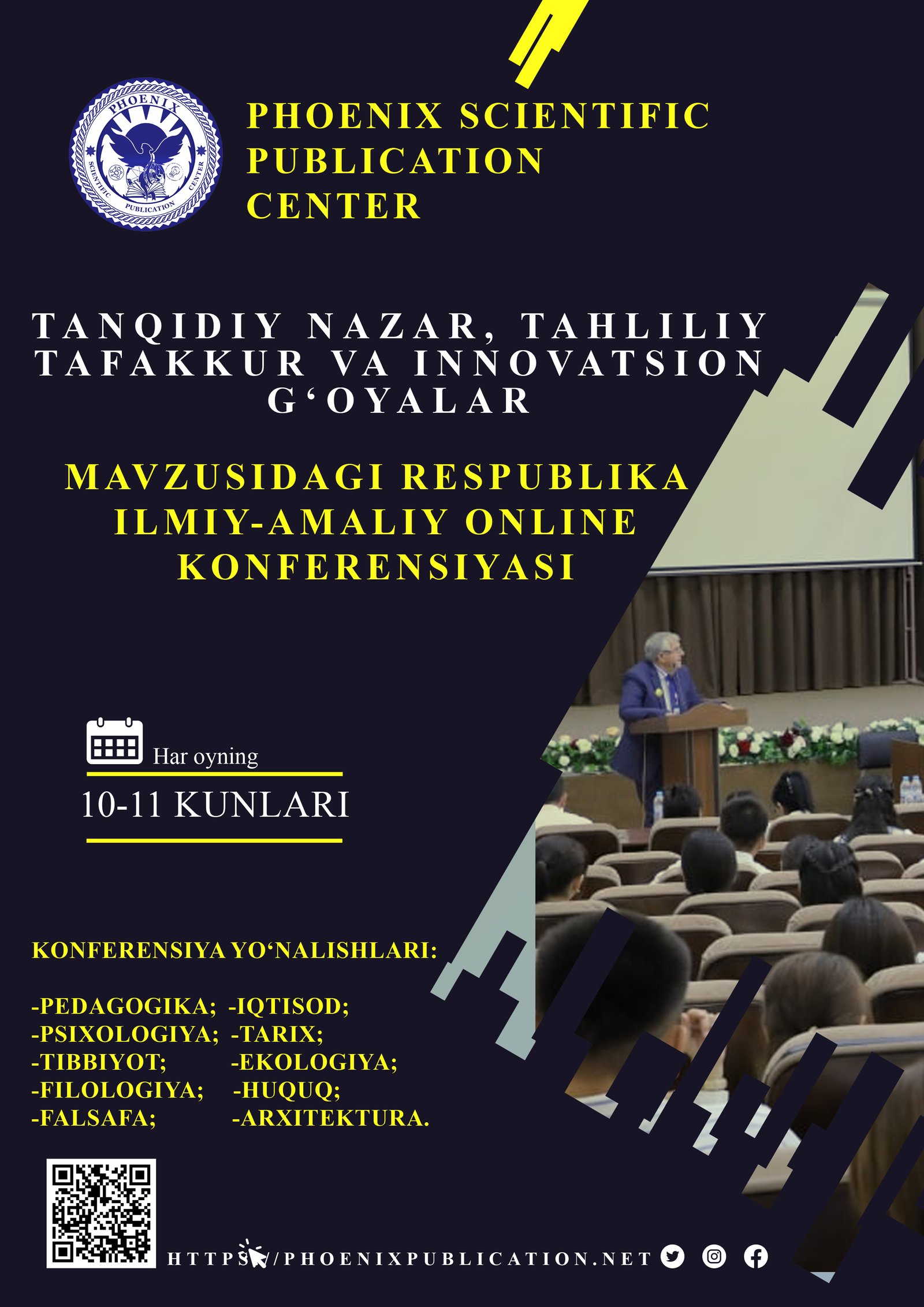Abstract
This article explores the integration of cognitive and reflective approaches into the design of chemistry lessons aimed at fostering students’ functional literacy. The study emphasizes the importance of moving beyond rote memorization toward developing higher-order thinking skills, such as analysis, reasoning, and metacognitive awareness. By incorporating strategies that engage students in reflective thinking—such as self-assessment, conceptual mapping, and inquiry-based learning—the research demonstrates how chemistry education can become more contextually relevant and personally meaningful. The paper presents practical models for lesson design and pedagogical tools that support the development of functional literacy in secondary school students. The findings underscore the role of cognitive engagement and reflective dialogue in building scientifically literate learners who are capable of applying chemical knowledge in real-life situations.
References
1. Bybee, R. W. (2013). The Case for STEM Education: Challenges and Opportunities. Arlington, VA: NSTA Press.
2. Xoliyorova S., Tilyabov M., Pardayev U. Explaining the basic concepts of chemistry to 7th grade students in general schools based on steam //Modern Science and Research. – 2024. – Т. 3. – №. 2. – С. 362-365.
3. Xayrullo o'g P. U. B., Rajabboyovna K. X. Incorporating Real-World Applications into Chemistry Curriculum: Enhancing Relevance and Student Engagement //FAN VA TA'LIM INTEGRATSIYASI (INTEGRATION OF SCIENCE AND EDUCATION). – 2024. – Т. 1. – №. 3. – С. 44-49.
4. Bransford, J. D., Brown, A. L., & Cocking, R. R. (2000). How People Learn: Brain, Mind, Experience, and School. Washington, DC: National Academy Press.
5. Xayrullo o'g P. U. B., Umurzokovich T. M. Inquiry-Based Learning in Chemistry Education: Exploring its Effectiveness and Implementation Strategies //FAN VA TA'LIM INTEGRATSIYASI (INTEGRATION OF SCIENCE AND EDUCATION). – 2024. – Т. 1. – №. 3. – С. 74-79.
6. Pardayev U. et al. THE EFFECTS OF ORGANIZING CHEMISTRY LESSONS BASED ON THE FINNISH EDUCATIONAL SYSTEM IN GENERAL SCHOOLS OF UZBEKISTAN //Journal of universal science research. – 2024. – Т. 2. – №. 4. – С. 70-74.
7. Bransford, J. D., Brown, A. L., & Cocking, R. R. (2000). How People Learn: Brain, Mind, Experience, and School. Washington, DC: National Academy Press.
8. Choriqulova D. et al. The role of the method of teaching chemistry to students using the" assessment" method //Modern Science and Research. – 2024. – Т. 3. – №. 11. – С. 256-264.
9. Narzullayev M. et al. THE METHOD OF ORGANIZING CHEMISTRY LESSONS USING THE CASE STUDY METHOD //Modern Science and Research. – 2024. – Т. 3. – №. 5. – С. 119-123.
10. Amangeldievna J. A., Xayrullo o'g P. U., Shermatovich B. J. Integrated teaching of inorganic chemistry with modern information technologies in higher education institutions //FAN VA TA'LIM INTEGRATSIYASI (INTEGRATION OF SCIENCE AND EDUCATION). – 2024. – Т. 1. – №. 3. – С. 92-98.
11. Amangeldievna J. A. et al. THE ROLE OF MODERN INFORMATION TECHNOLOGIES IN CHEMICAL EDUCATION //International journal of scientific researchers (IJSR) INDEXING. – 2024. – Т. 5. – №. 1. – С. 711-716.
12. Van Driel, J. H., Beijaard, D., & Verloop, N. (2014). Professional development and reform in science education: The role of teachers' practical knowledge. Journal of Research in Science Teaching, 38(2), 137–158.
13. Abdukarimova M. A. Q. et al. Tabiiy fanlar o ‘qitishda STEAM yondashuvi //Science and Education. – 2024. – Т. 5. – №. 11. – С. 237-244.
14. Xayrullo o'g P. U. et al. The importance of improving chemistry education based on the STEAM approach //fan va ta'lim integratsiyasi (integration of science and education). – 2024. – Т. 1. – №. 3. – С. 56-62.
15. O‘G‘Li U. B. X. et al. The effectiveness of using modern information and communication technologies (ICT) in chemistry education //Science and Education. – 2025. – Т. 6. – №. 2. – С. 350-363.
16. Tilyabov M., Pardayev U. KIMYO DARSLARIDA O ‘QUVCHILARNI LOYIHAVIY FAOLIYATGA JALB QILISH USULLARI //Modern Science and Research. – 2025. – Т. 4. – №. 5. – С. 42-44.
17. Pardayev U., Abdullayeva B., Abduraximova M. ZAMONAVIY VIRTUAL LABORATORIYA PLATFORMALARIDAN FOYDALANIB KIMYO FANINI O ‘QITISH SAMARADORLIGINI OSHIRISH //Modern Science and Research. – 2025. – Т. 4. – №. 5. – С. 48-50.
18. Xayrullo o‘g, P. U. B. (2025, June). CHEMICAL ANALYSIS-BASED ASSESSMENT OF THE HERBICIDAL EFFICIENCY OF AZIDO-SUBSTITUTED TRIAZINES. In CONFERENCE OF ADVANCE SCIENCE & EMERGING TECHNOLOGIES (Vol. 1, No. 2, pp. 53-62).
19. Xayrullo o‘g, P. U. B. (2025). INVESTIGATION OF THE REPELLENT ACTIVITY AGAINST IXODID TICKS BASED ON THE STRUCTURAL AND PHYSICOCHEMICAL PROPERTIES OF DIBUTYL ADIPATE. TANQIDIY NAZAR, TAHLILIY TAFAKKUR VA INNOVATSION G ‘OYALAR, 2(1), 265-273.
20. Shernazarov I. et al. Methodology of using international assessment programs in developing the scientific literacy of future teachers //Spast Abstracts. – 2023. – Т. 2. – №. 02.
21. Ergashovich S. I., Umurzokovich T. M. Preparation for International Assessment Research by Forming Types of Functional Literacy in Future Chemistry Teachers //Web of Technology: Multidimensional Research Journal. – 2023. – Т. 1. – №. 7. – С. 49-53.
22. Тилябов М. НАУЧНОЕ ЗНАЧЕНИЕ ПОДГОТОВКИ СТУДЕНТОВ К МЕЖДУНАРОДНОМУ ОЦЕНОЧНОМУ ИССЛЕДОВАНИЮ //Предпринимательства и педагогика. – 2024. – Т. 5. – №. 2. – С. 108-120.
23. Tilyabov M. Functional literacy competencies and methods for their development in future teachers //Решение социальных проблем в управлении и экономике. – 2025. – Т. 4. – №. 2. – С. 5-8.
24. Tilyabov M. Innovative methods for developing functional literacy in teaching students to think independently //Наука и инновации в системе образования. – 2025. – Т. 4. – №. 2. – С. 5-8.
25. Tilyabov M. U. DEVELOPING FUNCTIONAL LITERACY AND LOGICAL THINKING IN CHEMISTRY EDUCATION //Web of Teachers: Inderscience Research. – 2025. – Т. 3. – №. 5. – С. 154-161.
26. Vygotsky, L. S. (1978). Mind in Society: The Development of Higher Psychological Processes. Cambridge, MA: Harvard University Press.
